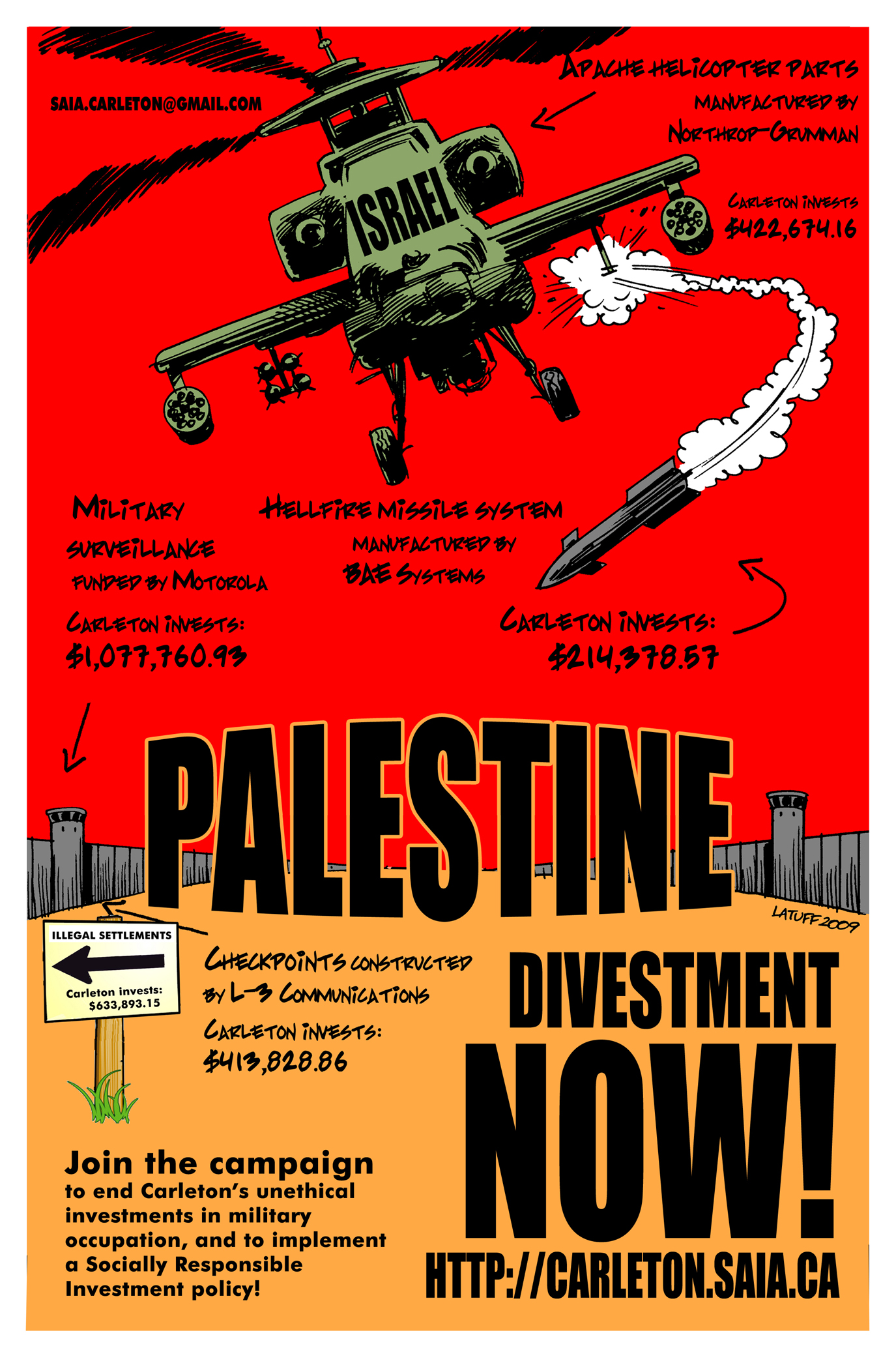Students Against Israel Apartheid – Carleton (SAIA) is a student activist group at Carleton University that has taken a stance: to stand up for human rights and in solidarity with the Palestinian people.
SAIA is neither a race nor religion based group because our respective backgrounds make no difference; on the contrary in fact, they help unite us. One of the most important events that SAIA plans each year is Israeli Apartheid Week (IAW), which takes place during the first week of March.
IAW is embarking its sixth year across the globe and its third at Carleton University. The event is international, with over 30 cities participating in 2009 and more expected to join this year. IAW is a weeklong series of events that feature lectures given by prominent speakers, film screenings, cultural performances and more.
IAW at Carleton has two main objectives. First, it aims to raise awareness on campus of the Palestinian liberation struggle. The second is action-oriented, as IAW aims to mobilize people in support of the call for boycott, divestment, and sanction (BDS), issued in July 2005 by over 170 Palestinian civil society organizations against Israeli Apartheid.
The three demands of the BDS movement are: full equality for Arab-Palestinian citizens of Israel; an end to the occupation and colonization of all Arab lands – including the Golan Heights, the Occupied West Bank with East Jerusalem and the Gaza Strip – and dismantling the Wall; and respecting and protecting the Palestinian refugees’ right to return to their homes and properties as stipulated in U.N. resolution 194.
As IAW has grown in scope and reach over the past six years, so have concerted attempts to suppress the week. Students organizing IAW 2009 in Ottawa were threatened with expulsion, and both Carleton and the University of Ottawa banned the IAW poster from campus. The poster featured an Apache helicopter firing a Hellfire missile on a defenceless child; the child’s shadow outlined the word “Gaza.” This was a cartoon representation of what happened during Israel’s invasion of Gaza in December 2008 and January 2009, where 1400 Palestinians were killed, over 400 of whom were defenseless children.
The poster was banned under the rationale that it “could be seen to incite others to infringe rights protected in the Ontario Human Rights code” and was “insensitive to the norms of civil discourse in a free and democratic society.” A message sent by the provost stated, “Carleton University, cannot and will not tolerate actions that infringe or contravene the Ontario Human Rights Code and Carleton’s own University Human Rights Policy and Procedures.” The banning sparked a controversial debate about free speech and repression of academic freedom that earned significant coverage in the mainstream media.
Despite intimidation tactics, this year more Canadian cities than ever are participating in IAW. From coast to coast, at least 14 campuses will be hosting events. This year’s overall theme is Solidarity in Action: Boycott, Divestment and Sanctions. Over the past year, worldwide momentum for BDS has increased and SAIA hopes that this year’s IAW will continue to provoke and inspire.
In conjunction with IAW’s goal to promote concrete BDS action, SAIA has launched a divestment campaign. Following several months of research, SAIA found that the Carleton University Pension Fund invests over $2 million in five companies – Motorola, BAE Systems, Northrop Grumman, L-3 Communications, and Tesco supermarkets – that are complicit in human rights violations and crimes under international law in Palestine. An ironic tie-in to last year’s IAW repression is that Carleton actually invests money in companies that produce the Apache helicopter and Hellfire missile, featured in the aforementioned poster. Taking full advantage of this irony, SAIA used a modified version of the banned poster to promote its divestment campaign launch this year, while highlighting Carleton’s unethical investments.
SAIA is calling upon Carleton to immediately divest from these companies, and to implement a broader Socially Responsible Investment policy. By mobilizing support throughout the campus community, SAIA is confident that the campaign will compel the university to cede to its demands, thus ensuring that Carleton will actually be “engaged in solving real-world problems,” as Carleton President Roseann Runte has declared in her strategic plan.
The large contingent of faculty members who support the divestment campaign and SAIA’s activities is inspiring. SAIA members have also had the chance to hear from a Carleton alumnus who was part of the university’s campaign to divest from apartheid South Africa in 1985; after two years of hard work and organizing, Carleton divested in 1987. We have our work cut out for us again today, but we hope that the university will be part of a larger movement, where colleges and universities employ SRI and divest from Israeli apartheid. In Massachusetts, Hampshire College has already set the precedent by divesting from companies supporting the Israeli occupation. We have a responsibility now to carry that momentum forward.
We are united in our cause; we know what we stand for: justice, equality, and human rights. We come from different backgrounds and religions, yet that makes no difference to us. Our differences inspire and unite us because we know that we are all brothers and sisters in humanity.
Heba Eid is a second year masters student at Carleton University and a member of SAIA.



